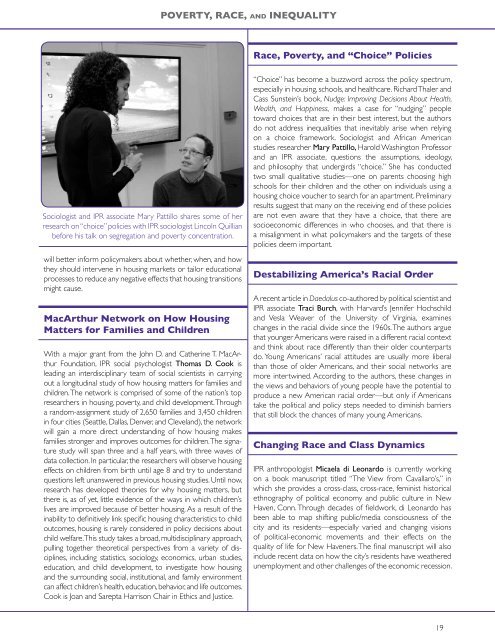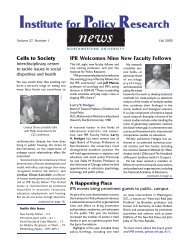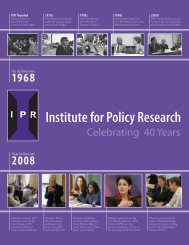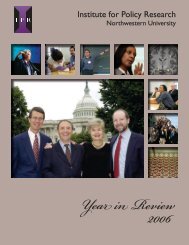Highlights of 2011 - Institute for Policy Research - Northwestern ...
Highlights of 2011 - Institute for Policy Research - Northwestern ...
Highlights of 2011 - Institute for Policy Research - Northwestern ...
Create successful ePaper yourself
Turn your PDF publications into a flip-book with our unique Google optimized e-Paper software.
Poverty, Race, AND Inequality<br />
Race, Poverty, and “Choice” Policies<br />
Sociologist and IPR associate Mary Pattillo shares some <strong>of</strong> her<br />
research on “choice” policies with IPR sociologist Lincoln Quillian<br />
be<strong>for</strong>e his talk on segregation and poverty concentration.<br />
will better in<strong>for</strong>m policymakers about whether, when, and how<br />
they should intervene in housing markets or tailor educational<br />
processes to reduce any negative effects that housing transitions<br />
might cause.<br />
MacArthur Network on How Housing<br />
Matters <strong>for</strong> Families and Children<br />
With a major grant from the John D. and Catherine T. MacArthur<br />
Foundation, IPR social psychologist Thomas D. Cook is<br />
leading an interdisciplinary team <strong>of</strong> social scientists in carrying<br />
out a longitudinal study <strong>of</strong> how housing matters <strong>for</strong> families and<br />
children. The network is comprised <strong>of</strong> some <strong>of</strong> the nation’s top<br />
researchers in housing, poverty, and child development. Through<br />
a random-assignment study <strong>of</strong> 2,650 families and 3,450 children<br />
in four cities (Seattle, Dallas, Denver, and Cleveland), the network<br />
will gain a more direct understanding <strong>of</strong> how housing makes<br />
families stronger and improves outcomes <strong>for</strong> children. The signature<br />
study will span three and a half years, with three waves <strong>of</strong><br />
data collection. In particular, the researchers will observe housing<br />
effects on children from birth until age 8 and try to understand<br />
questions left unanswered in previous housing studies. Until now,<br />
research has developed theories <strong>for</strong> why housing matters, but<br />
there is, as <strong>of</strong> yet, little evidence <strong>of</strong> the ways in which children’s<br />
lives are improved because <strong>of</strong> better housing. As a result <strong>of</strong> the<br />
inability to definitively link specific housing characteristics to child<br />
outcomes, housing is rarely considered in policy decisions about<br />
child welfare. This study takes a broad, multidisciplinary approach,<br />
pulling together theoretical perspectives from a variety <strong>of</strong> disciplines,<br />
including statistics, sociology, economics, urban studies,<br />
education, and child development, to investigate how housing<br />
and the surrounding social, institutional, and family environment<br />
can affect children’s health, education, behavior, and life outcomes.<br />
Cook is Joan and Sarepta Harrison Chair in Ethics and Justice.<br />
“Choice” has become a buzzword across the policy spectrum,<br />
especially in housing, schools, and healthcare. Richard Thaler and<br />
Cass Sunstein’s book, Nudge: Improving Decisions About Health,<br />
Wealth, and Happiness, makes a case <strong>for</strong> “nudging” people<br />
toward choices that are in their best interest, but the authors<br />
do not address inequalities that inevitably arise when relying<br />
on a choice framework. Sociologist and African American<br />
studies researcher Mary Pattillo, Harold Washington Pr<strong>of</strong>essor<br />
and an IPR associate, questions the assumptions, ideology,<br />
and philosophy that undergirds “choice.” She has conducted<br />
two small qualitative studies—one on parents choosing high<br />
schools <strong>for</strong> their children and the other on individuals using a<br />
housing choice voucher to search <strong>for</strong> an apartment. Preliminary<br />
results suggest that many on the receiving end <strong>of</strong> these policies<br />
are not even aware that they have a choice, that there are<br />
socioeconomic differences in who chooses, and that there is<br />
a misalignment in what policymakers and the targets <strong>of</strong> these<br />
policies deem important.<br />
Destabilizing America’s Racial Order<br />
A recent article in Daedalus co-authored by political scientist and<br />
IPR associate Traci Burch, with Harvard’s Jennifer Hochschild<br />
and Vesla Weaver <strong>of</strong> the University <strong>of</strong> Virginia, examines<br />
changes in the racial divide since the 1960s. The authors argue<br />
that younger Americans were raised in a different racial context<br />
and think about race differently than their older counterparts<br />
do. Young Americans’ racial attitudes are usually more liberal<br />
than those <strong>of</strong> older Americans, and their social networks are<br />
more intertwined. According to the authors, these changes in<br />
the views and behaviors <strong>of</strong> young people have the potential to<br />
produce a new American racial order—but only if Americans<br />
take the political and policy steps needed to diminish barriers<br />
that still block the chances <strong>of</strong> many young Americans.<br />
Changing Race and Class Dynamics<br />
IPR anthropologist Micaela di Leonardo is currently working<br />
on a book manuscript titled “The View from Cavallaro’s,” in<br />
which she provides a cross-class, cross-race, feminist historical<br />
ethnography <strong>of</strong> political economy and public culture in New<br />
Haven, Conn. Through decades <strong>of</strong> fieldwork, di Leonardo has<br />
been able to map shifting public/media consciousness <strong>of</strong> the<br />
city and its residents—especially varied and changing visions<br />
<strong>of</strong> political-economic movements and their effects on the<br />
quality <strong>of</strong> life <strong>for</strong> New Haveners. The final manuscript will also<br />
include recent data on how the city’s residents have weathered<br />
unemployment and other challenges <strong>of</strong> the economic recession.<br />
19

















